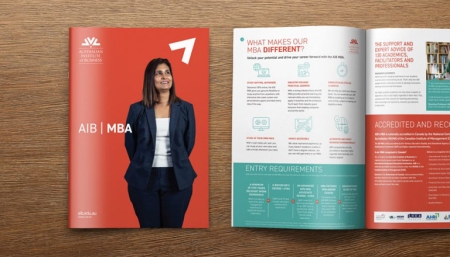The importance of a study plan for MBA success

“If you fail to plan, you plan to fail.” – Benjamin Franklin
In just nine words, an important message is conveyed, which can be applied across many areas of life. As a business school student, likely while working full-time, chances are you already understand the value of effective and strategic planning in business.
But despite the reinforcement of planning’s role in business, many of us don’t make the time to plan elements of our studies or personal lives.
At AIB, we don’t just think that study planning is important – it’s essential.
Why a study plan is important for an MBA
A good study plan includes everything from schedule management, to having the right study resources at hand, knowing your deadlines and maintaining study spaces for greater productivity.
If any one of these key study planning elements are missing, your productivity can suffer. Here are the main reasons why prioritising study planning is important for the business school journey.
A study plan keeps you on track and focused
When there are so many other things going on during your studies, such as work deadlines and family commitments, it can be difficult to keep up the required pace. There will be times when you will lack motivation to study – this is when having a solid study plan is most important.
Planning out your time and priorities from the get-go can help keep you on track as you hold yourself accountable to your plan. While procrastination can affect even the most focused of students, it’s less likely to strike and stick around when you’re progressing towards your goals.
Challenges to your progress won’t be as catastrophic
When you’re organised and aware of what you need to do, you’re more likely to be cool, calm and collected when challenges arise.
When inevitable events transpire, such as sickness or a demanding work deadline, a well-planned study schedule will ensure you won’t be completely thrown off track. This is where contingencies are key – all plans regardless of their purpose require contingencies.
You’re more likely to succeed
Whether your definition of success means submitting every assessment on time or maintaining high grades, study planning and preparation contributes greatly to achieving your study goals.
Studying programmes such as the Fast-Track MBA while working full-time will improve your planning, scoping and time management skills greatly. For students who juggle multiple priorities, a study plan becomes far more than just a schedule to maintain – it’s a roadmap to success.
Leanne Smith, AIB MBA graduate and Valedictorian, explained that her number one tip for success is to be organised and plan. “If you are like me and you are trying to work full-time, study, and juggle everything else so that you have some kind of life – planning is really, really important,” she said.
Having a plan is great for mental health
With everything else going on in life, it’s essential to feel calm and on top of your studies. When we’re organised, it avoids any unnecessary stress and chaos, particularly as things won’t be left until the last minute. Good mental health is an integral component to study success, and effective study planning should ensure you’re in the right headspace to tackle everything else.
Six quick study planning tips:
Now that you know the importance of a study plan, it’s time to put one into action. If you haven’t undertaken any study planning before, or in a while, our top six tips are as follows.
- Get yourself a study schedule, and use it!
- Personalise your study plan to suit your lifestyle and productivity levels.
- Don’t compromise your study sessions – treat them as a meeting you can’t miss.
- Preparation is key – this means study area, downloaded or printed learning materials, stationery, food, drink and more.
- Allow for some contingency time – not everything will go to plan.
- Remember to include time for breaks – mental health is integral to study success.
Study planning is an important part of the business school journey, particularly when you’re a working adult. Just remember, if you go to the effort of planning – do your best to stick to it!
This article was written by Laura Hutton on behalf of the Australian Institute of Business. All opinions are that of the writer and do not necessarily reflect the opinion of AIB.





